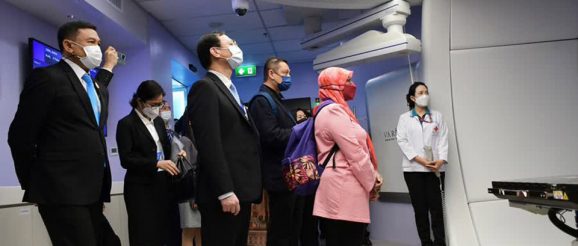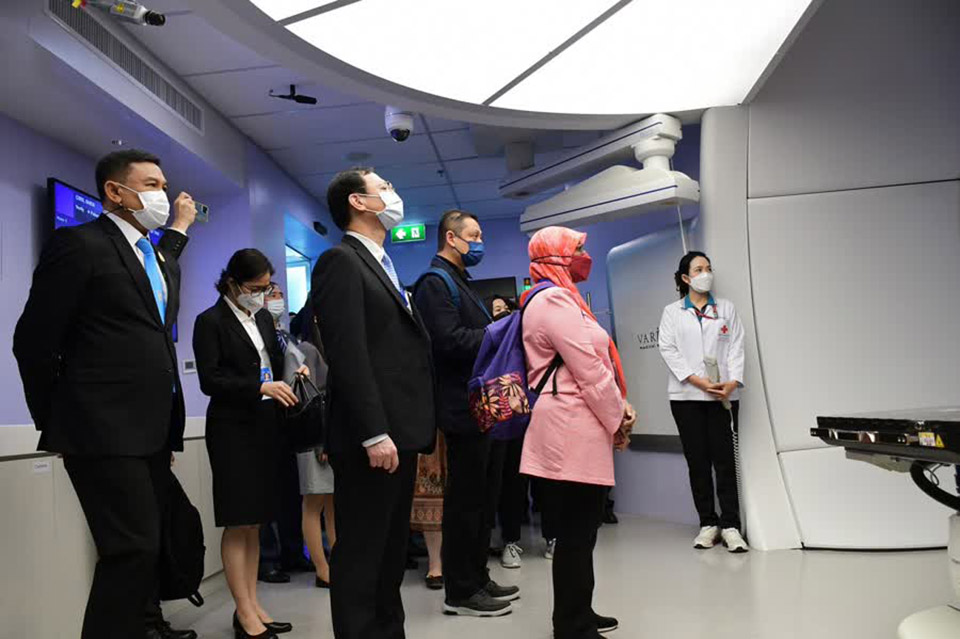APEC delegation visits Chulalongkorn Hospital to observe use of innovation in public health affairs


APEC Health Week 2022 is taking place from August 22 to 26, with talks on post-Covid rehabilitation of health systems and economies being the main agenda. As part of the event, representatives from Asia-Pacific Economic Cooperation (APEC) economies visited Chulalongkorn Hospital to observe Thailand’s use of technology and innovation to improve healthcare. More details in this report.
Dr. Sura Wisetsak, deputy permanent secretary of the Ministry of Public Health, led about 80 APEC representatives on a study trip to Chulalongkorn Hospital in Bangkok. The delegation observed medical and public health processes that make use of advanced technology and innovations. These processes also correspond to the Thai government’s Bio-Circular-Green (BCG) economy model. The activity is one of several sub-events taking place through APEC Health Week from August 22 to26.
Dr. Sura said the spread impacted the economies of many countries, and the same goes for Asia-Pacific Economic Cooperation (APEC) economies. The BCG model is therefore being presented at APEC meetings in 2022 as a means for sustainably and inclusively rehabilitating economies amidst rapid changes. Emphasis is on using technology and innovation to improve businesses, add value and reduce losses. More accountability toward the environment is also a point of emphasis. During the visit, the delegation of APEC representatives was presented with Thailand’s medical and public health innovations employed under 4 initiatives, which in turn correspond to Thailand’s main BCG push.
The first of the four initiatives is the Her Royal Highness Princess Maha Chakri Sirindhorn Proton Center (HPSP), operated by Chulalongkorn Hospital, Thai Red Cross Society. It is the first place in Southeast Asia to offer radiotherapy for cancer patients using proton particles. Treatment involves the use of the superconducting cyclotron machine housed in the center to accelerate protons and project them onto cancer cells. The treatment offers high-accuracy irradiation of target cancer clusters, which enables better quality of life and greater longevity for cancer patients.
The second initiative, Princess Sirindhorn Craniofacial Center, is Southeast Asia’s largest craniofacial defects treatment center. The center services individuals with congenital craniofacial defects as well as those caused by accidents. The center has become an important learning center for medical personnel in Thailand as well as those from abroad. Notably, the center’s use of the “Chula Technique” on Frontoethmoidal Encephalomeningocele (FEEM) patients has now been adopted worldwide.
The third initiatve, Relief, and Community Health Bureau, Thai Red Cross Society, facilitate assistance for victims of disasters. Its work extends to pre-disaster preparations, post-disaster rehabilitation, and community health. Medical, physical rehabilitation, health promotion, and disease prevention services are delivered via 13 Thai Red Cross stations. The initiative also provides mobile medical units offering ophthalmic surgery and cosmetic surgery to people suffering from detects, in addition to dental services.
The fourth initiative, the Mo Phrom mobile application, was launched in the early period of the COVID-19 pandemic. Initially, the application enabled people to access their vaccination information and schedule vaccination appointments. It has since evolved into Thailand’s largest digital health platform accessed by 32 million users. The application is still being developed and expanded on.
APEC Health Week meetings are taking place in Bangkok this week, with public health ministers from APEC economies in attendance. The health ministers are engaging in talks under the theme “Open to Partnership. Connect with the World. Balance Health and the Economy”. The meetings will generate awareness about post-pandemic rehabilitation efforts in the aspects of health, economy, and innovations for the future global health system. (NNT)
 |
